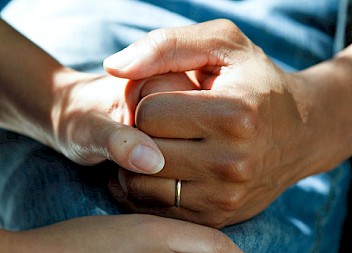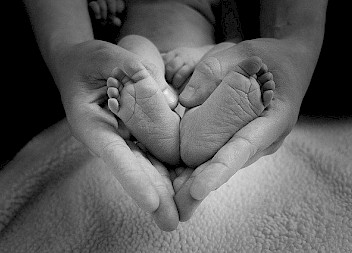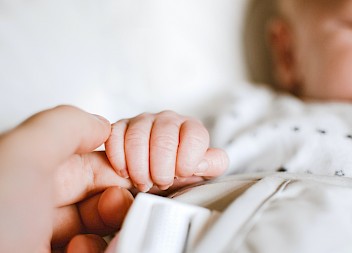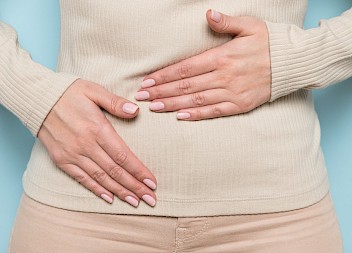No parents-to-be should ever have to leave hospital without their baby but, sadly, thousands of parents each year experience the indescribable heartache of losing a child to stillbirth or neonatal death.
While stillbirth rates have reduced in recent years, neonatal deaths have plateaued. But the life-long impact of knowing a stillbirth or neonatal death could have been avoided remains devastating and painful for families.
Whether your loss was preventable or not, it's important to reach out for help getting through this heartbreaking time. See our list of support resources for those dealing with grief, including resources for those who have lost a baby.
Infant mortality caused by clinical negligence
What is the difference between a stillbirth and neonatal death?
- Stillbirth is where a baby dies in the womb after 24 weeks gestation; they are born without any signs of life - no heartbeat, no breath taken.
- Neonatal death is when a baby is born alive but dies within the first 28 days of life.
- The loss of a baby before 24 weeks is classed as a miscarriage.
By law, the difference between stillbirth and neonatal death is that a stillborn child and its mother are legally classed as one single entity. This means that the claim is brought as the mother’s claim, whereas in a neonatal death case, there is not only a claim for the mother (or father) but also a claim on behalf of the deceased baby.
Medical Negligence Leading to Neonatal Death or Stillbirth
Not all stillbirths or neonatal deaths are preventable and a large proportion occur in seemingly healthy babies. However, around 100 babies a year are stillborn because of trauma or an event that was not well-managed or anticipated.
Common examples of stillbirth or neonatal death caused by negligence include:
- Failure to act on reduced movements - pregnant mothers should not be ignored or told not to worry if they experience a reduction in antenatal movements. Midwifery teams should monitor the baby in utero.
- Failure to adequately monitor the baby in hospital - particularly lack of foetal heart rate monitoring or incorrect interpretation of cardiotocography (CTG).
- Failure to identify growth restrictions - if it is presumed during regular antenatal check-ups that foetal growth has trailed off or slowed down, the mother should be regularly monitored and assessed with growth scans. Sometimes, there is a failure to measure the fundal height (the vertical height of your pregnancy belly), or measurements are incorrectly plotted on the growth chart, which can result in misdiagnosis. Towards the end of pregnancy, the only way to safely deal with growth restrictions is to induce labour and deliver the baby.
- Failure to detect placental abruption - if a pregnant woman is presenting pain (and possibly bleeding) caused by the placenta pulling away from the womb, there may be a failure to recognise these as signs of placental abruption, resulting in a delay in providing adequate care for her and her unborn child. There may also be a failure to recognise the risks of abruption, such as pre-eclampsia or growth restrictions.
- Failure to treat group B strep - this is a common bacterial infection found in the vagina and is normally harmless. But if it spreads to the baby during vaginal delivery, it can make them seriously ill. In some cases, it can be fatal. If Group B Strep is suspected, antibiotics should be given before labour. There may be a delay or total failure to administer this, or results may not be followed up after birth.
- Mismanagement of high-risk mothers - mothers over 40, who have conceived via IVF or with conditions such as diabetes and pre-eclampsia, should be closely monitored throughout their pregnancy. Often, they should not be allowed to reach 40 weeks before delivering their baby, due to an increased risk of stillbirth after 37 weeks.
Can you claim compensation for stillbirth or neonatal death?
No amount of money will change what happened and no parents ever choose to make a stillbirth compensation claim simply to compensate for the loss of their child. Most want answers as to what happened and why, and to ensure no other families go through the same harrowing experience.
Any monies that are recovered through a medical negligence claim for stillbirth or neonatal death can be used in a positive way, such as to pay for private counselling for psychiatric injuries or grief.
Who can bring a neonatal death or stillbirth negligence claim?
If you are making a claim for the loss of a baby due to stillbirth, it is important to note that the claim will be by the mother for her injury.
This will usually be compensation for the pain and suffering of a psychiatric injury caused by the death of her unborn child, as well as loss of satisfaction of bringing a pregnancy to conclusion. Secondary victims, such as the other parent, may also be able to claim for psychological injuries.
For neonatal death claims, the claim is for the mother and the estate of the deceased child.
Claiming compensation for stillbirth or neonatal death
Because stillbirth legally classes a mother and her unborn child as a single entity, statutory compensation for bereavement is not awarded. However, a stillbirth claim can account for financial losses, including:
- Funeral expenses
- Money spent preparing for the pregnancy (i.e., essentials such as cot, pram etc)
- Counselling
- Fertility treatment for future pregnancies
- Loss of earnings for time off work due to grief
- Costs of having another child delivered at a private hospital
In neonatal death claims, it is possible to claim for the estate of the deceased child, meaning a fixed sum bereavement award is given. This is £12,980 for deaths before 1 May 2020, and £15,120 thereafter. This statutory award is available either to the mother or to the parents of the deceased child (split equally between the two parents).
Again, financial losses as above can be claimed, including compensation for psychological harm for secondary victims, like the baby’s father, or close relatives, such as a grandparent who witnessed the traumatic events.
Neonatal Death and Stillbirth Compensation Claims
At Medical Solicitors, we have worked with bereaved families to secure compensation where stillbirth or neonatal death could have been prevented. They can then use the money to plan a funeral, engage with therapists or other mental health specialists or be able to take time off work to grieve.
Some of our case studies in this field include:
- £120,000 for a woman following the stillbirth of her unborn child
- £300,000 to a woman for the stillbirth of her baby
- £408,100 to a deceased child’s parents after their son died due to the hospital’s failure to manage his birth correctly
At Medical Solicitors, we understand that grieving such a loss is an indescribably emotional and vulnerable time; our experts are compassionate and will help you make sense of the process, leading you every step of the way. If you would like to discuss your case and whether you might be able to bring a claim, please talk to our experts today.








